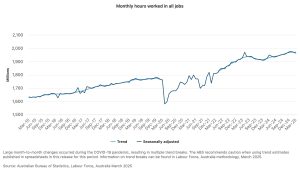As the cost of living continues to rise, more young people are turning to second jobs. Image source: Pixabay
Topic and angle
Faced with high rents, soaring food prices and stagnant real wages, more and more young Australians are choosing to take on more than one job, eking out a living in the “side hustle” and platform economy. According to ABC News (2024), more than 970,000 people are working two or more jobs.
Is side hustle a proxy for “flexibility” or institutionalized poverty? Do young people choose freedom, or do they have no choice?
This story will examine why more and more young people under 30 are having to work two or even three jobs to make ends meet, and why they are struggling to pay their rent, bills and school loans, through the latest figures from Australian Bureau of Statistics (ABS) (March 2025) and the ABC’s report on young people’s multiple jobs, this story will look at why more and more young people under the age of 30 are having to work two or even three jobs just to make ends meet, struggling to pay their rent, bills and school loans.

Over 970,000 people now work two or more jobs. Image source: Pixabay
Genre
The news will be presented in the form of news commentary, led by clear arguments criticizing the loopholes in the current system and platforms, and calling on the government and trade unions to step up reforms to fight for more rights and protection for young people. Data, character interviews and case studies will support the main argument.
Publication and target user group
The story will be published by The Guardian Australia, which focuses on social inequality, youth issues and labor rights and often publishes in-depth news commentary.
The target audiences includes:
Young people aged 18-40 who are sensitive to social issues
Policymakers, labor organizations and trade unionists
Ordinary workers directly affected by the multiple jobs
Sources of information
Interviews:
Mia, a 25-year-old student: retail by day, delivering Uber Eats by night
A single mother who works in retail Monday through Friday and drives an Uber on the weekends to make ends meet.
Documentary/Online:
Related news stories from ABC News
ABS Employment Trends Report March 2025
Multimedia, hypertext and interactivity

Australians are clocking in longer hours each month as the pressure to keep up with living expenses intensifies. Image source: ABS Labour Force, Australia (March 2025)
Interactive graph:
“Is your hourly rate really enough to live on?” : Enter occupation and hours worked, compare cost of living (rent, food, energy).
Short video documentary:
Followed a “working mom” for 24 hours, interspersed with economists explaining policy contradictions.
Interactive Quiz Poll:
Do you need two or more jobs to make a living?
Data visuals:
Showing trends in the number of part-time/side hustlers 2020-2025
Significance
Against the context of the housing crisis and youth underemployment, the casual labor platform has quietly become an important pillar of the Australian economy. But without institutional safeguards, it can also push a generation into a cycle of chronic poverty. This paper confronts the structural system failure and calls on the Australian government to create a more protective labor system for young people.
References
Australian Bureau of Statistics. (2025, March 20). Labour force, Australia. Australian Bureau of Statistics. https://www.abs.gov.au/statistics/labour/employment-and-unemployment/labour-force-australia/latest-release
Daly, N. (2025, January 12). Nearly a million Australians work two or more jobs as inflation bites. Abc.net.au; ABC News. https://www.abc.net.au/news/2025-01-13/side-hustles/104803142
Herbert, B. (2024, May 13). Skipping meals and working 80-hour weeks: Australians are holding down multiple jobs to ease cost-of-living pressures. ABC News. https://www.abc.net.au/news/2024-05-14/australians-working-two-jobs-cost-of-living-federal-budget/103831008


Be the first to comment